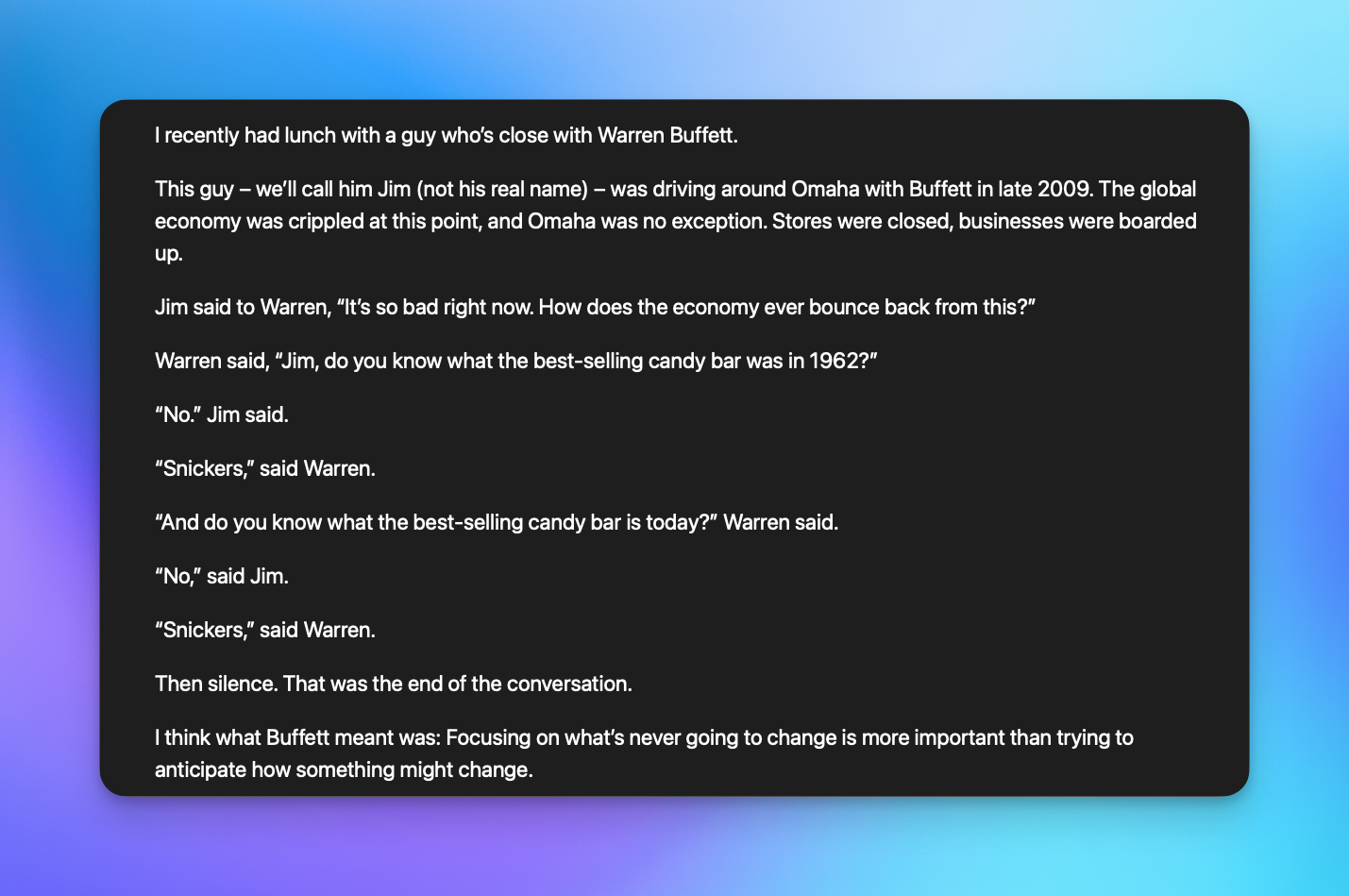DPS 周刊 127 - Same as Ever

Morgan Housel 的文章简明易懂,直中要害。我们已经分享了二十多篇,比如



最近 Morgan 出了新书 Same as Ever,这本书其实是从他的的文章 A Few Good Stories 展开的。在这篇文章中,他引用了巴菲特的故事:
当巴菲特被问道,经济什么时候才能恢复。巴菲特反问道,1962年和现在最畅销的糖果是什么?答案都是士力架。在他看来,关注哪些不太会变化的远比关注哪些变化的要重要得多。
这篇文章的线上版本已经删去了这一故事,不过我们在 DPS 598 中有摘录:


Same as Ever 就是这么一本书,梳理了很多长久不变却被我们忽视的道理。比如对于历史的解读,人们往往只看到结果,却无法追溯他们的起因:
An irony of studying history is that we often know exactly how a story ends, but we have no idea where it began.
Ignoring that family tree can muddy your understanding of events, giving a false impression of why things happened, how long they might last, and under what circumstances they might occur again.
关于风险,其实能够遇见的风险并不是真正的风险。真正可怕的是,那些不在我们认知范围内的风险,所以我们无法遇见他们的到来,也就没有办法准备预案:
The biggest risk is always what no one sees coming, because if no one sees it coming, no one’s prepared for it; and if no one’s prepared for it, its damage will be amplified when it arrives.
That’s the real definition of risk—what’s left over after you’ve prepared for the risks you can imagine.
Risk is what you don’t see.
The biggest news, the biggest risks, the most consequential events are always what you don’t see coming.
Invest in preparedness, not in prediction.
It’s better to have expectations that risk will arrive, though you don’t know when or where, than to rely exclusively on forecasts
Two, realize that if you’re only preparing for the risks you can envision, you’ll be unprepared for the risks you can’t see every single time.
Morgan 认为预期才是真正决定我们是否快乐的因素,只要预期够低,就很容易变得快乐。
Your happiness depends on your expectations more than anything else.
Montesquieu wrote 275 years ago, “If you only wished to be happy, this could be easily accomplished; but we wish to be happier than other people, and this is always difficult, for we believe others to be happier than they are.”
People gauge their well-being relative to those around them, and luxuries become necessities in a remarkably short period of time when the people around you become better off.
Everything is relative, and mostly relative to those around you.
Money buys happiness in the same way drugs bring pleasure: incredible if done right, dangerous if used to mask a weakness, and disastrous when no amount is enough.
We might have higher incomes, more wealth, and bigger homes—but it’s all so quickly smothered by inflated expectations.
Part of the reason, I’ve come to believe, is that expectations for Truman’s abilities were so low that any leadership qualities he exhibited blew people’s minds. A little success was a win; a big success felt like a miracle.
The first rule of a happy life is low expectations.
My friend Brent has a related theory about marriage: It only works when both people want to help their spouse while expecting nothing in return. If you both do that, you’re both pleasantly surprised.
One is the constant reminder that wealth and happiness is a two-part equation: what you have and what you expect/need.
至于天才,Morgan 认为独特的个性是他们成功密不可分的一部分,所以我们要么全盘接受,要么就毫不买账。
People who think about the world in unique ways you like almost certainly also think about the world in unique ways you won’t like.
The key thing is that unique minds have to be accepted as a full package, because the things they do well and that we admire cannot be separated from the things we wouldn’t want for ourselves or we look down upon.
Boyd realized there was a tactical advantage not in how fast or high a plane could fly, but how quickly it could change course and begin climbing—a discovery that altered not only how pilots thought but how planes were built.
Part of this idea is realizing that people who are capable of achieving incredible things often take risks that can backfire just as powerfully.
这个世界充满了不确定性,而我们却一直在苦苦追寻确定性。如果换做用概率的角度来看待事物,我们就不会被确定性所困扰,因为一切都充满了可能性。
A common trait of human behavior is the burning desire for certainty despite living in an uncertain and probabilistic world.
The core here is that people think they want an accurate view of the future, but what they really crave is certainty.
A related and equally important problem here is how easy it is to underestimate rare events in a world as large as ours.
If one person plays the lottery, the odds of picking the winning numbers twice are indeed 1 in 17 trillion. But if one hundred million people play the lottery week after week—which is the case in America—the odds that someone will win twice are actually quite good. Diaconis and Mosteller figured it was 1 in 30.
There are about eight billion people on this planet. So if an event has a one-in-a-million chance of occurring every day, it should happen to eight thousand people a day, or 2.9 million times a year, and maybe a quarter of a billion times during your lifetime.
People don’t want accuracy. They want certainty.
Morgan 本人就是一位讲故事的大师,而他也一再强调讲故事的能力:
If you have the right answer and you’re a good storyteller, you’ll almost certainly get ahead.
Good stories tend to do that. They have extraordinary ability to inspire and evoke positive emotions, bringing insight and attention to topics that people tend to ignore when they’ve previously been presented with nothing but facts.
What Sapiens does have is excellent writing. Beautiful writing. The stories are captivating, the flow is effortless. Harari took what was already known and wrote it better than anyone had done before. The result was fame greater than anyone before him could imagine. Best story wins.
The valuation of every company is simply a number from today multiplied by a story about tomorrow.
The most persuasive stories are about what you want to believe is true, or are an extension of what you’ve experienced firsthand.
Good stories create so much hidden opportunity among things you assume can’t be improved.
Who has the right answer, but I ignore because they’re inarticulate? And what do I believe is true but is actually just good marketing?
很多进展看起来需要很长的周期才实现,而很多灾难看起来转眼就发生了。这是因为进展并不一定是线性发展的,中间充满了各种波折,这进一步让我们觉得他们发展缓慢。而很多灾难都是一步步小的错误叠加而成的,这些错误并不起眼,以至于我们忽略他们的存在,所以这些灾难看似一转眼就发生。
从另一个角度而言,如果我们希望有正向的结果,就需要坚持,不断地尝试,这个过程可能会很长,尤其当我们身处其中。所以我们就更加需要保持乐观,一直坚持下去。
Most great things in life—from love to careers to investing—gain their value from two things: patience and scarcity. Patience to let something grow, and scarcity to admire what it grows into.
Stress, pain, discomfort, shock, and disgust—for all its tragic downsides, it’s also when the magic happens.
New technologies take years or decades for people to even notice, then years or decades more for people to accept and put to use.
Progress always takes time, often too much time to even notice it’s happened.
Growth always fights against competition that slows its rise.
Making a human: incomprehensibly complex. The death of a human: really simple.
A lot of progress and good news concerns things that didn’t happen, whereas virtually all bad news is about what did occur.
It is so easy to discount how much progress is achievable.
Most catastrophes come from a series of tiny risks—each of which is easy to ignore—that multiply and compound into something huge.
So the small bombs increased the odds of the big bombs being used.
Small risks weren’t the alternative to big risks; they were the trigger.
Big risks are easy to overlook because they’re just a chain reaction of small events, each of which is easy to shrug off.
Little changes compounded for a long time create extraordinary changes.
Optimism and pessimism are so hard to deal with. Pessimism is more intellectually seductive than optimism and captures more of our attention. It’s vital for survival, helping us prepare for risks before they arrive.
A big thing to know about how people think is that progress requires optimism and pessimism to coexist.
The best financial plan is to save like a pessimist and invest like an optimist.
Things will eventually get better. But we’re not going home by Christmas.
You could tell three things about Bill Gates pretty quickly. He was really smart. He was really competitive; he wanted to show you how smart he was. And he was really, really persistent. From the day he started Microsoft, he insisted on always having enough cash in the bank to keep the company alive for twelve months with no revenue coming in.
What Gates seems to get is that you can only be an optimist in the long run if you’re pessimistic enough to survive the short run.
The trick in any field—from finance to careers to relationships—is being able to survive the short-run problems so you can stick around long enough to enjoy the long-term growth.
The key thing about evolution is that everything dies.
The best any species can do is to be good at some things until the things it’s not good at suddenly matter more. And then it dies.
A species that evolves to become very good at one thing tends to become vulnerable at another.
Perfecting one skill comes at the expense of another skill that will eventually be critical to survival.
Big innovations don’t come at once, but rather are built up slowly when several small innovations are combined over time.
缓冲的重要性不言自明,但是我们往往忽略缓冲的存在,比如现金,试错空间,以及对于痛苦的忍耐程度。当我们把这些都视作缓冲的话,长期而言,我们就能明白他们存在的意义:他们帮助我们抵御暂时的挑战,从而帮助我们获得最终的成功。
The irony is that people can get some of their most important work done outside of work, when they’re free to think and ponder.
Room for error is often viewed as a cost, an anchor, an inefficiency. But in the long run it can have some of the highest payoffs imaginable.
Cash is an inefficient drag during bull markets and as valuable as oxygen during bear markets.
This is one of the most useful life skills—enduring the pain when necessary rather than assuming there’s a hack, or a shortcut, around it.
Every job comes with pieces you don’t like. And we need to say: That’s part of it.
Most things worth pursuing charge their fee in the form of stress, uncertainty, dealing with quirky people, bureaucracy, other peoples’ conflicting incentives, hassle, nonsense, long hours, and constant doubt. That’s the overhead cost of getting ahead.
Every industry and career is different, but there’s universal value in accepting hassle when reality demands it.
All of them are bad. But all have to be endured to some degree if you want to get anything done.
The most dominant creatures tend to be huge, but the most enduring tend to be smaller. T-Rex < cockroach < bacteria.
What’s incredible about this is that evolution encourages you to get bigger, then punishes you for being big.
The only thing harder than gaining a competitive edge is not losing an advantage when you have one.
Evolution is ruthless and unforgiving—it doesn’t teach by showing you what works but by destroying what doesn’t.
Another takeaway is to keep running. No competitive advantage is so powerful that it can let you rest on your laurels—and in fact the ones that appear to do so tend to seed their own demise.
复杂的东西之所以好卖,是因为人们不太相信简洁的东西,并把长度作为一个基本的衡量标准。当你对一件复杂的事似懂非懂时,你会更加买账。所以面对复杂的事物,我们不妨尝试将它们与我们熟悉的事物联系起来,看看能不能解构他们。
The sore truth is that complexity sells better.
Primitive animals often had many duplicate body parts, then evolution reduced the number but increased their usefulness.
The million things you thought you had to memorize are simply various combinations of the core principles.
Complexity gives a comforting impression of control, while simplicity is hard to distinguish from cluelessness.
Things you don’t understand create a mystique around people who do.
When you understand things I don’t, I have a hard time judging the limits of your knowledge in that field, which makes me more prone to taking your views at face value.
Length is often the only thing that can signal effort and thoughtfulness.
Simplicity feels like an easy walk. Complexity feels like a mental marathon.
An effective rule of thumb doesn’t bypass complexity; it wraps things you don’t understand into things you do.
一周精选
北京时间12月17日晚上九点,我们将邀请获得了法国护照的小菜。小菜曾经在法国攻读葡萄酒和烈酒管理研究生,毕业后又在法国工作了一段时间。在此期间,选择加入了法国国籍。他将分享:
- 法国工作申请
- 法国留学申请
- 法国入籍申请
- 法国生活简介
讲座预计一小时,前面45分钟由嘉宾分享,剩余时间是问答环节。
免费注册即可获得会议链接:

加拿大一直是移民的热门选项,其中的 Express Entry 项目的打分水涨船高,每一次邀请都创造新高。最新一轮的打分已经达到了561分,要知道满分才600分。EE 这个项目固然好,只是现在这样非要拼个头破血流才有可能拿到的情形下,再去争取是否还值得呢?
同样的,我们从小到大的人生似乎都是一个模子里出来的:小学要考高分才能进好的初中,中考考了高分才能进高中,高考考了高分才能进好大学,考研考了高分才能读研,更不用说后面的考博,之后的找工作。似乎只有照着这个模版成长才是成功的人生。可是真的如此吗?

Anne-Laure Le Cunff 建议我们专注在高杠杆的任务上:
- 高杠杆的任务并不等于辛苦的任务,相反,高杠杆的任务可以利用较少的精力和时间产生很大的影响;
- 通过这样的专注,你可以有更多时间来关注生活中其他重要的事物;
- 专注高杠杆任务的第一步是统计你每天的时间分布;
- 第二步是专注只能你做的事物;
- 每天专注的高杠杆事物不要超过两三项;
- 多花时间在自己身上,在自己的成长上,在可以产生复利的事物上。

Seth Godin 指出别人和你有相同的点子其实是件好事:
- 你其实无法确认这个点子是从你这抄袭过去的,也许他们也正好下扛到了这一点;
- 如果其他人也想到了这一点,正好验证了你的想法;
- 而且当它们被其他人发出来,其实有助于这一点子的传播;
- 如果有很多人都有相似的想法,正好说明你其实正在风口上。

Morgan Housel 分析了节俭和独立的区别:
- 两者的根本区别在于如何使用财富。前者可以为了财富而剥夺自己的快乐,而后者可以为了快乐而运用财富;
- 有些人为了财富,愿意牺牲快乐;
- 有些人为了快乐,愿意牺牲财富。

Greg Brockman 分享了他学习机器学习的经历:
- 作为 Stripe 的前 CTO,OpenAI 的创始人之一,他的编程能力毋庸置疑,但是他一直没有开始学习机器学习。后来他发现这里面最主要的障碍就是自己的心态 -- 认可自己是一个初学者;
- 当他开始认真学习机器学习时,发现有很多阻碍,特别是起步特别费劲,这让他想起自己刚学习编程时的状态;
- 即使一开始并不自信,他依旧坚持,因为他想看懂其他 OpenAI 的项目;
- 比较幸运的是,他的伴侣给了他很大的容错空间;
- 另外一点是,他一直在别人的项目上贡献一些改进,而不是从头开始,这样每一点贡献都是对他的激励;
- 这样的学习持续了半年之后,他才感到自己掌握了一些机器学习的要点。
- 他说其实最重要的就是,允许自己失败,然后从这些失败中学习,最终才能成功。而这段过程其实比你想象得要短。
其实我们之前分享了天勾贾巴尔对于科比的评价,他最佩服科比的一点就是,科比其实是 NBA 史上失手最多的选手,但他的得分却名列前茅。这说明,科比其实是 NBA 史上从失败中爬起来最多的选手。如果科比和 gdb 都能允许自己失败,都能从失败中爬起,你我为什么不能呢?

Jacob Kaplan-Moss 认为做出有效决策的第一步是达成一个共识:即如何达成这一决策。为此他提出了一个七步的框架:
- 记录提议。
- 与指导小组分享文档。
- 确定利益相关者名单。
- 运用上面这一共识。
- 反馈和讨论。
- 基于先前的共识做出决定。
- 开始行动。

我们已经开通了微信支付和支付宝支付,如果你想及时读到 DPS 的全文,不妨直接付费订阅:
关于支付的详情介绍,可以访问这一页面。
Archive




















本周的生产力日报集合就到此为止,如果你有什么建议,也欢迎留言告诉我们。如果想要收到最及时的推荐,不妨订阅我们的频道,或者付费解锁更多增值内容,我们下期见。





Comments ()